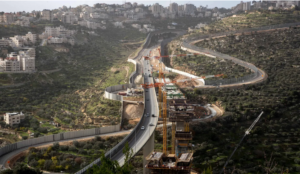Israel to discuss controversial construction that would cut West Bank in two

Highway 60, which passes through Gush Etzion settlement block in the West Bank. The new road will pass through area B, an area where Israel does not have the authority to plan and build roads
Yaniv Kubovich reports in Haaretz on 7 June 2023:
The Civil Administration plans to discuss opposition to construction in the E-1 area near Ma’aleh Adumim, beyond the 1967 border. The plan drew international criticism since construction in this area will sever the link between the northern and southern parts of the West Bank, making it difficult to establish a contiguous Palestinian state in the future.
The discussion, scheduled for Monday, will be the third one to deal with opposition to the plan, after which it will be sent for final approval by the Civil Administration, which oversees operations in the West Bank.
The defense establishment has opposed the implementation of this plan over the last few years, due to the objections of the U.S. and the European Union. This position is usually accepted by political echelons in Israel. Next week’s discussion will take place against the backdrop of the tension between Washington and Jerusalem following the decision to allow settlers to transfer their yeshiva in Homesh to a location situated on so-called “state land,” in contravention of international law, in order to legalize the outpost. According to the U.S., Israel had promised not allow Israelis to permanently reside in Homesh.
The E-1 area spans 12 square kilometers (4.6 square miles), now under the municipal jurisdiction of Ma’aleh Adumim, lying north and west of the city. Plans for construction there have been in place since the Rabin government, but their implementation has been delayed since 2005 due to international pressure. In 2013 there was a discussion in the Civil Administration’s planning council regarding construction in this area, at the initiative of Prime Minister Benjamin Netanyahu. The plans were approved. Britain and France responded by recalling their ambassadors in Israel. After the election that year, the plans were put on hold.
In 2017, there was another attempt to advance construction in E-1 through a law annexing Ma’aleh Adumim. The intention was to apply Israeli law to the city, and thus to E-1, which was annexed to the city’s municipal jurisdiction. The law was supposed to come to a vote at the ministerial legislation committee, but Netanyahu torpedoed the vote in the wake of messages he received from then-President Donald Trump.
In 2020, Netanyahu announced that he had instructed the renewed promotion of the construction plan. This is the plan now slated for discussion by the Civil Administration next week, which includes the building of 3,500 apartments in E-1. These discussions have been postponed several times. Thus, for example, a meeting scheduled for last July was postponed ahead of President Biden’s visit to Israel.
Opposition to this plan was presented, among others, by the Palestinian cities of Azariyah and Anata, on behalf of residents of the neighborhood of Isawiya, in East Jerusalem, as well as by Israeli human rights NGOs. The objections by Peace Now, Ir Amim and the Association for Environmental Justice argue that construction in E-1 will cancel the only land reserve in the middle of the Ramallah-Jerusalem-Bethlehem metropolitan area. In which one million Palestinians live.
They also argued that the plan could affect a future peace agreement, because it will create a continuous bloc of Jewish settlement running from the central West Bank to Jerusalem and thereby sever the northern West Bank from the southern part.
The city of Anata wrote in its list of objections that even though the plan would affect thousands of Palestinian residents of the area, the state hasn’t publicized the plan in Arabic. Consequently, a significant share of the people potentially harmed by it were unable to file objections.
Moreover, it said, the plan would severely harm the Bedouin who have lived in the area for decades but would now have to leave their homes. “The plan’s approval would force these communities to uproot themselves from the place where they have lived for decades, and this would constitute forcible transfer, which is forbidden by international law,” it argued.
This article is reproduced in its entirety
